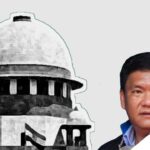Code:
(1)1[2* * * when the case is of the nature referred to in clause (i) or clause (ii) of sub-section (3) of section 174], the nearest Magistrate empowered to hold inquests shall, and in any other case mentioned in sub-section (1) of section 174, any Magistrate so empowered may hold an inquiry into the cause of death either instead of, or in addition to, the investigation held by the police officer; and if he does so, he shall have all the powers in conducting it which he would have in holding an inquiry into an offence.
3[(1A) Where,–
(a) any person dies or disappears, or
(b) rape is alleged to have been committed on any woman,
while such person or woman is in the custody of the police or in any other custody authorised by the Magistrate or the Court, under this Code in addition to the inquiry or investigation held by the police, an inquiry shall be held by the Judicial Magistrate or the Metropolitan Magistrate, as the case may be, within whose local jurisdiction the offence has been committed.]
(2) The Magistrate holding such an inquiry shall record the evidence taken by him in connection therewith in any manner hereinafter prescribed according to the circumstances of the case.
(3) Whenever such Magistrate considers it expedient to make an examination of the dead body of any person who has been already interred, in order to discover the cause of his death, the Magistrate may cause the body to be disinterred and examined.
(4) Where an inquiry is to be held under this section, the Magistrate shall, wherever practicable, inform the relatives of the deceased whose names and addresses are known, and shall allow them to remain present at the inquiry.
3[(5) The Judicial Magistrate or the Metropolitan Magistrate or Executive Magistrate or police officer holding an inquiry or investigation, as the case may be, under sub-section (1A) shall, within twenty-four hours of the death of a person, forward the body with a view to its being examined to the nearest Civil Surgeon or other qualified medical person appointed in this behalf by the State Government, unless it is not possible to do so for reasons to be recorded in writing.]
Explanation.–In this section, the expression relative means parents, children, brothers, sisters and spouse.
Explanation:
This section mandates an inquiry by a Magistrate whenever there is a suspicion of unnatural death, accidental death, or death under suspicious circumstances. The Magistrate’s role is to investigate the cause of death and determine if any offense has been committed.
- Unnatural Death: Death caused by external factors like violence, poisoning, or other suspicious means.
- Accidental Death: Death resulting from an unforeseen incident.
- Suspicious Death: Death where the cause is unclear, and the circumstances raise doubt.
The Magistrate conducts the inquiry based on evidence collected, witnesses examined, and medical reports.
Illustration:
Imagine a person found dead in a house with signs of struggle. The police suspect foul play. In this scenario, a Magistrate would be required to conduct an inquiry under Section 176 of CrPC. The Magistrate would gather evidence, examine witnesses, and obtain a post-mortem report to determine the cause of death. If the inquiry reveals a crime, the Magistrate would initiate a criminal investigation.
Common Questions and Answers:
Q: Who can initiate an inquiry under Section 176?
A: The inquiry is initiated by a Magistrate, usually a Judicial Magistrate First Class (JMFC), upon receiving information about the death.
Q: What are the powers of the Magistrate during the inquiry?
A: The Magistrate has the power to summon witnesses, examine them, seize evidence, and order medical examinations.
Q: What happens after the inquiry?
A: Based on the findings, the Magistrate may:
-
- Close the inquiry if no offense is found.
- Initiate a criminal investigation if a crime is suspected.
- Refer the case to a higher court if necessary.









